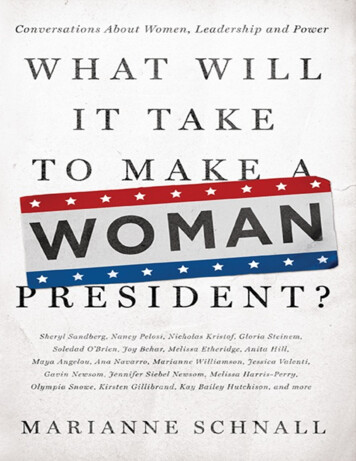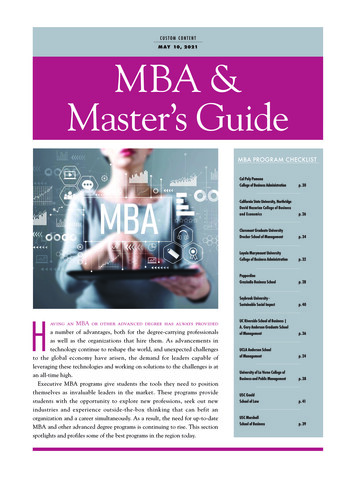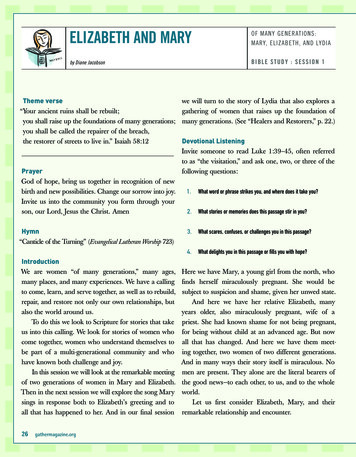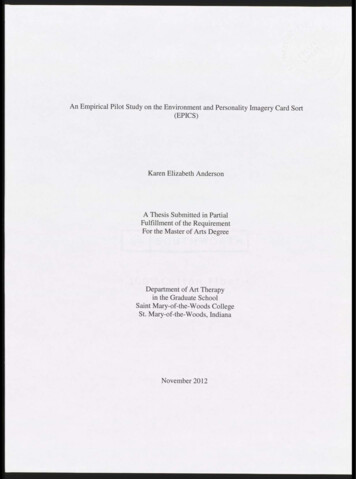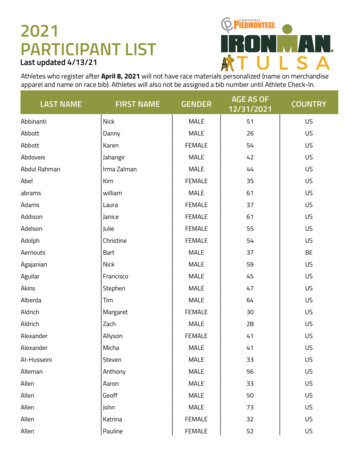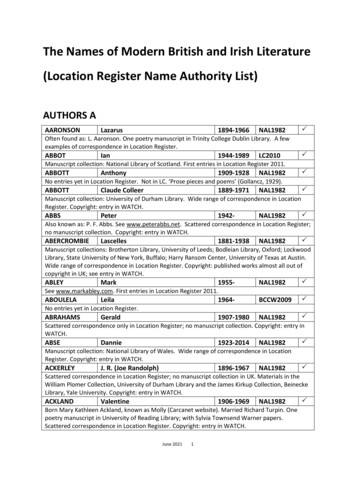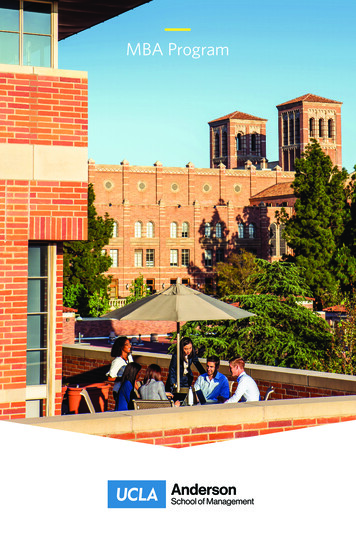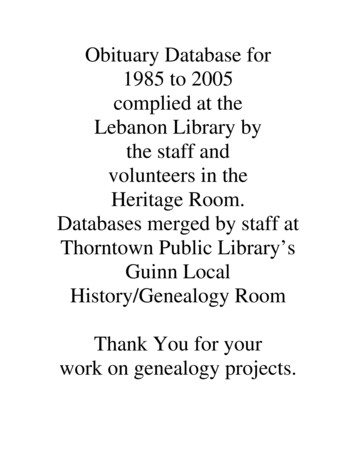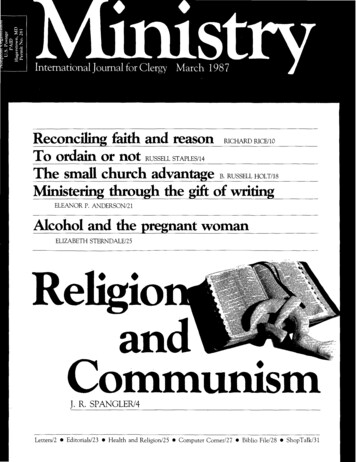
Transcription
International Journal for Clergy MarchReconciling faith and reason RICHARD RICE/10To ordain or not RUSSELL STAPLES/14The small church advantage B. RUSSELL HOLT/18Ministering through the gift of writingELEANOR P. ANDERSON/21Alcohol and the pregnant womanELIZABETH STERNDALE/25ReligioCommunismJ. R. SPANGLER/4Letters/2 Editorials/23 Health and Religion/25 Computer Corner/27 Biblio File/28 ShopTalk/31
LettersComputersI really appreciated the article "Computers: What You Need to Know"(November 1986). Include more articlesof this type, won't you please, for usbeginners?—Ronald R. Neall, Upatoi,Georgia. Thanks again for the article on computers.—Ted Struntz, Lincoln,Nebraska.Not guiltyI found the article by Cathy McBride,"When Guilt Is Not From God"(November 1986), stimulating andhelpful. Thank you for regularly sendingme MINISTRY.—Fred R. Manthey, Jr.,Ph.D., Dunmore, Pennsylvania.Hit targetWe disagree in some areas, but thearticle "Commitment Versus Career,"by Rex D. Edwards (November 1986),was on target. Thank you!—Michael R.Proctor, Juneau, Alaska.Getting out of debt on one salary?I read an article on how a pastor andhis family can make ends meet on onesalary (May 1986). My wife and I havealways known that this is the best way tolive. We really want my wife to be athome with our two children, ages 2 and4- I would like to press the question alittle further and ask not just how afamily can live on a pastor's salary buthow a family can get out of debt whileliving on a pastor's salary. Our lifestyle iswhat I consider rather simple, and as Ilook at our finances and expenses I seehow we could comfortably live on apastor's salary if we were out of debt.We've just finished our experience atthe seminary, where we took out a loanfor my education (considerably less thansome of my friends borrowed). This loanis now being paid along with one that mywife had taken out while she was incollege. We owe money to some familymembers, we are making payments on acar, we've had major repairs on our othercar, and my wife has had some expensivemedical tests.I want to say that we are notcompulsive users of the plastic card.Almost a year has gone by and wehaven't used it at all. All in all, we have adebt of about 20,000. I don't know ifthat is an inordinate amount, relativelyspeaking, but I do know that trying toliquidate it while living on a pastor'ssalary is very discouraging. Only a smallproblem can throw us into a majorfinancial crisis. What ideas do youreaders have for quickly getting out ofdebt?By the way, I really enjoy MINISTRYmagazine. Our conference sends it to us.It is the only magazine we receive, sincewe can't afford a subscription to anythingelse.—Name withheld.No nit-pickingI have been receiving copies gratis andwant you to know that I appreciate theobvious devotion of your writers and theprofessional skills they bring to theirtask. Keep up the good work, and don'tlet the nit-picking of the "always right"fringe get to you. I'm referring specifically to the Marietta, Georgia, letterwriter (November 1986) whose comments were inexcusable but not unexpected. You Adventists do good work.Keep it up.—Reed Holmes, RetiredClergyman, Jonesport, Maine.Telling loyal oppositionI would very much appreciate gettingthe issue that had the follow-up editorialto "Does the Church Need a LoyalOpposition?" (May 1986). I am in aparish that has great potential for growthbut also has a very vocal opposition. Ineed to know if they are out to help me ordestroy me. Please send me that followup editorial ("Identifying the LoyalOpposition," July 1986) and include meon your bimonthly subscription list.—Name withheld.More prayersHere is an addition to that thoughtfulprayer ("Books That Have Enriched MyDevotional Life," November 1986)—since it is designed to portray life as itreally is: The fragmented body of theaborted baby awaiting incineration withthe clinic's garbage.—David F. Wilbur,St. Nicholas Congregation, Dacada,Wisconsin.Drop MINISTRYThrough my own studies and theteachings of my denomination, I believethat the Seventh-day Adventist is anon-Christian cult.With that in mind I feel your literaturehas no place in our church. Pleaseremove our church from your mailinglist.—L. Devon Aaron, Lincolnton,Georgia.Anabaptists helpful1 am not a Seventh-day Adventist, butam one of those pastors who receive yourmagazine, MINISTRY, as a gift. I findmany interesting articles in it, and wantto thank you for your kindness.In your July, September, andNovember issues you ran a series ofarticles on the Anabaptists, and since Iam teaching a church history class forthirteen weeks on Sunday nights, I amsharing these articles with the dozen orso in the class.—E. C. Schumacher,Pastor, Salina, Kansas.If you're receiving MINISTRY bimonthly without having paid for a subscription, it's not a mistake. Since 1928, MINISTRY has been publishedfor Seventh-day Adventist ministers, but we believe the time has come for clergy everywhere to experience a resurgence of faith in the authorityof Scripture and in the great truths that reveal the gospel of our salvation by grace, through faith alone in Jesus Christ. We want to share withyou our aspirations and faith in a way that we trust will provide inspiration and help to you too. We hope you will accept this journal as ouroutstretched hand to you. Look over our shoulders, take what you want and find helpful, and discard what you cannot use. Bimonthly giftsubscriptions are available to all licensed and/or ordained clergy; requests should be on church letterhead.MINISTRY/MARCH/1987
First GlanceMINISTRY is the international journal of the Seventh-day Adventist Ministerial Association.ASSOCIATION SECRETARY:Floyd BreseeEDITOR:J. Robert SpanglerEXECUTIVE EDITOR:J. David NewmanIn 1984 Bob and Marie Spangler visited the Soviet Union andbrought us a report covering church-state relations and the status ofchurches—particularly the Adventist Church—in that country.Last year Bob and Marie made a return visit and included Poland andCzechoslovakia on their itinerary. This issue contains a full report oftheir recent trip.Can believers think? Can thinkers believe? In an article that willchallenge your thinking, Richard Rice untangles the knottyrelationship of faith and reason.Continuing our discussion on the ordination of women, RussellStaples looks at the question from the perspective of the socialsciences. His background and training enable him to make a uniquecontribution. He grew up and began his ministry on the Africancontinent, and has expertise in both theology and anthropology.Noting that most pastors will spend their entire ministry in smallchurches, former MINISTRY editor Russell Holt writes that that's notnecessarily bad news, and lists six advantages small churches haveover larger ones. If you are ministering in a small church, you canmake the most of your ministry there by using these advantages.Eleanor Anderson encourages pastors' spouses who want to add totheir income to try writing. Their special experiences give theminsights on topics that are in demand.And don't miss our article on alcohol and the pregnant woman.Elizabeth Sterndale writes about Fetal Alcohol Syndrome, the majorpreventable cause of retardation.ASSISTANT EDITORS:David C. JarnesKenneth R. WadeSEMINAR DIRECTOR:Rex D. EdwardsCONTRIBUTING EDITORS:Carlos AeschlimannRaoul DederenAriel RothMarie SpanglerGary SwansonN. C. WilsonCONSULTING EDITORS:Galen BosleyC. E. BradfordEllen BreseeP. Gerard DamsteegtRoland R. HegstadFrank HolbrookKenneth J. MittleiderRichard TibbitsLeo R. Van DolsonEDITORIAL SECRETARIES:Ella RydzewskiMary Louise McDowellART DIRECTOR:Byron SteeleDESIGNER:G. W. BuschMARKETING:Tom KapustaADVERTISING SALES:Jeff BlumenbergSUBSCRIBER SERVICES:Larry BurtnettINTERNATIONAL CORRESPONDENTS:Africa-Indian Ocean, John W. FowlerEastern Africa, Harry A. CartwrightEuro-Africa, Johannes MagerFar East, James H. ZacharyInter-America, Salim JapasNorth America, William C. Scales, Jr.Trans-Europe, Mark FinleySouth America, Amasias JustinianoSouth Pacific, A.D.C. CurrieSouthern Asia, Saudagar ChandMINISTRY, (ISSN 0026-5314), the international journal of the Seventh-day AdventistMinisterial Association 1987, is publishedmonthly by the General Conference ofSeventh-day Adventists and printed by theReview and Herald Publishing Association,55 West Oak Ridge Drive, Hagerstown, MD21740, U.S.A. Subscriptions: US 19.95 for12 issues in U.S., US 22.95 for 12 issueselsewhere. Single copy: US 2.00. MemberAssociated Church Press. Second-class postage paid at Hagerstown, Maryland.This publication is available in microfilmfrom University Microfilms International.Call toll-free 800-521-3044. Or mail inquiryto: University Microfilms International, 300North Zeeb Road, Ann Arbor, MI 48106.Postmaster: Send address changes to MINISTRY, 55 West Oak Ridge Drive, Hagerstown, Maryland 21740.Editorial Office: 6840 Eastern AvenueNW., Washington, D.C. 20012. Stamped,self-addressed envelope should accompanyunsolicited manuscripts.COVER PHOTO BY MEYLAN C. THORESENVOLUME 60NUMBER 3MINISTRY/MARCH/1987
Religion andCommunismJ. R. SpanglerMINISTRY'S editorreports on religiousfreedom and theadvance ofAdventism in theSoviet Union, Poland,and Czechoslovakia.]. Robert Spangler is theeditor of MINISTRYmagazine and an associate director of the Ministerial Association ofthe General Conferenceof Seventh-day Adventists.4MINISTRY/MARCH/1987early three years agomy wife and I visitedthe Soviet Union atthe joint invitationof the Soviet government's Council onReligious Affairs andof Seventh-day Adventist Churchleaders in that country. In September of1986, responding to a similar invitation,we spent three weeks there, accompanied this time by Dr. V. N. Olsen,former president of Loma Linda University.Our travels in that part of the worldtook us more than 10,000 miles. We metwith non-Adventist government andreligious leaders and Adventist Churchmembers and ministers in Moscow, thecapital city; Tashkent in central Asia;Novosibirsk, the central city of Siberia;Lvov and Chernovtsy, cities near thePolish and Romanian borders in thesouthwest; the port city of Odessa on theBlack Sea; and finally Riga, Latvia, onthe Baltic Sea.Pastors Mikhail P. Kulakov and N. A.Zhukaluk, Soviet Adventist Churchleaders, had carefully planned our trip,arranging visits with political and religious leaders throughout the SovietUnion in addition to appointments withAdventist church groups. (Pastor Kulakov's son Mikhail—whom I affectionately called Mike—translated for Olsenand me, and Galina Gritsuk served mywife as both translator and companion.)The attentive service of our churchleaders and our translators and thehospitality of our members guaranteed amost pleasant and profitable tour. SovietChristians are some of the most graciousand warmhearted people in the world.Do Christians suffer in Communistbloc countries?Everywhere I report on visits toCommunist countries, people ask aboutreligious persecution. What is the truth?I questioned our church leaders carefullyand was unable to find any evidence thatAdventists were in prison for any reasonthat could be connected with theirreligious beliefs—not even for participation in "underground activities." Somemay wonder if our leaders would know ifa member was incarcerated. From whatI've observed, it would be quite impossible for them not to know, no matterwhat the reason behind the incarceration!Our leaders, and those of the RussianOrthodox Church and the Muslim faith,indicated that the winds of religiousfreedom are increasing. We could sensethe change in atmosphere. In a conversation I had with a Soviet governmentofficial, he remarked, "It was thoughtthat after the revolution in 1917, religion would vanish—but it didn't. Wemade a mistake. Not that the conceptsand philosophy of Communism arewrong. . . . The mistake was in thepractical application of these concepts.Sometimes it is difficult to harmonizetheory and practice."Now Soviet newspapers are printingarticles touching on religion, an indication that it is legitimate to discussreligion in the press for other purposesthan simply to denigrate it.Aitmatov's work titled "The VChopping Block," presently being published by installments in the Sovietmagazine Novy Mir (New World), offersone example. It says people today are in adark pit. Not knowing the way out, they
bump against trees and each other. Thisarticle indicates that the reason for thissituation is that religion was taken frompeople and they were given nothing inreturn.As another example, portions of theSoviet media openly suggest that tounderstand their culture, Soviets muststudy their country's important Christian thinkers and theologians of the past.An article in the August 1986 issue ofOgonyek, a weekly social, political, andliterary magazine and one of the nation'smost popular journals, provides an evidence of this. In that article, SergeyAverintsev, a renowned specialist onculture, claims that one cannot fullyunderstand Russian culture withoutbeing acquainted with Vladimir Solovyov's The justification of Good and TheThree Conversations. Solovyov was aleading Christian philosopher in Russiain the nineteenth century. His workshave not been published since 1917, theyear of the Russian Revolution.Averintsev has also published a newtranslation of the book of Job. Thisbiblical book is now part of the SovietLibrary of World Literature. We hopethat this foreshadows the entire Biblebeing made available through thenation's bookstores.(Let me note here that amongAdventists in the Soviet Union, everyfamily and most individuals have theirown copies of the Bible, and many havehymnbooks. Recently the governmentprinted 10,000 Bibles for us.)Oppression's religious rootsMuch of the religious persecution thatthis world has seen has taken place whenreligious organizations have dominatedsecular governments. This has been trueparticularly when governments and religions have united to rule the masses.Even today, much of the conflict aroundthe world—the riotings, bombings,hijackings, and civil wars—involves astrong religious element. Unfortunately,Jesus' words "I have not come to bringpeace, but a sword" (Matt. 10:34, RSV)are seeing a fulfillment beyond theiroriginal intent.Many of the books that have beenwritten about the causes of the FrenchRevolution reveal the far-reaching consequences of the rejection of the Bibleand of true Bible religion. I believe thatthe battle against the Bible that tookplace during that revolution occurredmainly as a result of the apostate statechurch's perversion of the gospel andsuppression of the Scriptures. At thattime France had the unique distinctionof being the only nation on earth whoselegislative assembly had officiallydeclared that there was no God.Similar factors have underlain modern Communism's attitudes toward religion. In old Russia when the churchformed alliances with the secular state,its witness was prostituted, Christianitywas perverted, and the oppression ofreligious minorities resulted. The objective student of religious history cannotmake a wholesale condemnation of theCommunist system when he knows thatthe church is simply reaping what it hassown.In his book World Communism inEndtime Prophecy, Carsten Johnsenunderscores this point. He writes, "Thechurch has professed Christ, whiledefending doctrine and practice quitethe antithesis of His. It must then bear itsshare of responsibility, not only for theappeal of Communism, but also for itsvery existence" (p. 12).Under Rome, mankind was blessedwith many benefits. And yet this samepower conquered the world and heldmillions in slavery. Rome's aims andobjectives are summed up in the words ofVirgil's Aeneid:"But Rome! 'tis thine alone withawful sway,To rule mankind, and make theworld obey,Disposing peace and war thine ownmajestic way."Under Rome's tyrannical rule, JesusChrist was crucified, the apostle Paul wasexecuted, and many other Christianswere cruelly persecuted and martyred.The all-powerful emperors held theoffice of pontifex maximus, which madethem the head of the state religion, andin time they demanded to be recognizedas fountains of all wisdom and power,and even to be worshiped as gods. Yetthough Rome caused so many of God'schildren to suffer, I fail to find a singleinstance of Christ challenging or condemning its authority. Furthermore,Paul, before his death under the Romansword, admonished the church to "besubject unto the higher powers. For thereis no power but of God: the powers thatbe are ordained of God. Whosoevertherefore resisteth the power, resisteththe ordinance of God: and they thatresist shall receive to themselves damnation" (Rom. 13:1, 2).The objective studentof religious historycannot make awholesalecondemnation of theCommunist systemwhen he knows thatthe church is reapingwhat it has sown.Paul does not imply in these versesthat God always approves the conduct ofcivil governments. Certainly He wasextremely unhappy with Hitler andStalin, who each were responsible for thedeaths of millions. Paul's point is that aslong as God entrusts human governmentto men and as long as the laws of thesegovernments do not conflict with Hiscommandments, we are to obey thesegovernments, even when religious freedoms are limited.Christians will support the authorityof the existing state and will not presumeto resist or attempt to depose the powersthat be except by legal means. Christ'smessage is one of peace and brotherlylove.We are to pray for those in authority(1 Tim. 2:1-2) and to obey them (Titus3:1). Peter commands Christians tosubmit "to every ordinance of man forthe Lord's sake" (1 Peter 2:13).On the other hand, this same Petertold the ruling power in Judaism—theSanhedrin—"Judge for yourselveswhether it is right in God's sight to obeyyou rather than God. For we cannot helpspeaking about what we have seen andheard" (Acts 4:19, 20, NIV). BecausePeter and the other apostles disobeyedthe proscriptions the Sanhedrin hadenjoined upon them, that governinggroup had the apostles arrested andimprisoned. In his defense, Peter simplysaid, "We must obey God rather thanmen!" (Acts 5:29, NIV).Is there then a contradiction inScripture? No! The Bible does notsuggest we must render absolute obedience to the civil authorities. Only God isworthy of absolute obedience. Our obedience of the civil authorities, compreMINISTRY/MARCH/19875
This Polish Adventist seminary has 40 students in residence and another 70 off-campus students.hensive though it may be, must come toan end in those instances where theirlaws conflict with God's commands. Thecivil powers have no authority over ourwitnessing to the gospel. If the civilpowers attempt to restrict the Christian'switness, he or she is free to obey ordisobey as the Holy Spirit leads.Christians should do everything intheir power to avoid conflict with thegovernment. If some means of witnessing are forbidden, but they can obey thegovernment and proclaim the gospel justas effectively by other means, theyshould use the latter. But if laws forbidthem to witness for Christ, they mayhave no other choice than to follow theexample of Peter and the other apostlesin disobeying the authorities. This maylead to prison and even death, as it didfor the apostles; but it might also lead tothousands being added to the church(Acts 2:41, 47; 4:4; 5:14; 6:7).MINISTRY/MARCH/1987In harmony with these biblical concepts, the Seventh-day AdventistChurch decided to recognize in theU.S.S.R. only that group of Adventiststhat is registered by the government—the vast majority of Adventists. This hasbrought considerable unity and strengthto our membership of nearly 35,000.Overplaying Communism'srestrictionsAccording to Mark Elliott's informative article on Eastern Europe in Eternity,July/August 1986, more than 200 parachurch groups are attempting to respondto the needs of Christians in Communistcountries. These groups represent a"veritable explosion of Western interestin Soviet bloc Christians." Elliott questions the motives of some of theseorganizations, which raise millions ofdollars for the aiding of the religiouslyand economically oppressed. He says,"Some missions play to the reactionarytendencies of at least some of theirdonors by giving way to sensationalism.One West Coast misson director statedin an interview that his literature purposefully concentrated on emotionallycharged articles because copy highlighting violence and physical abuse ofbelievers stimulated donations. Associated Press religion writer George Cornell is right in saying some groups make aliving 'peddling hate and fear' " (pp. 25,26).Those who are deeply concerned forChristians in the Communist world,those who sincerely and honestly areattempting to share the good news withthese countries, are to be commended.Yet a word of caution is in order. Whilewe must recognize that religious freedomin most Communist countries does notequal that of the West, we must also askwhat use Christians in these countries
are making of the freedoms they do have.Reverend Michael Zhidkov, vice president of the Baptist Union in theU.S.S.R., told me, "At most, we useapproximately 70 percent of the rightsthat are available to us."So rather than emphasizing therestrictions that are there, let me pointout what we can and are doing toadvance the gospel in these Eastern bloccountries. Our church is able to worshipfreely in its buildings. We are able tosecure property and to build newchurches as permission is granted. Weare able to do personal witnessing tothose who show an interest in learningabout Christ and the gospel. We canarrange for the government presses to dosome printing for us; they have producedBibles, songbooks, and a limited amountof other Christian literature. And parents are allowed to arrange Sabbathprivileges with school authorities,though at times this can be difficult.A further indication of the openingdoors came while we were eating our lastmeal in Moscow in an apartment madeavailable to us by the Baptists, whosechurch we share there. During that mealPastor Kulakov was handed a letter fromthe chairman of the executive committee of Tula giving us permission to start aBible correspondence school for ourministers. Our leaders in the SovietUnion have secured property betweenMoscow and Tula that we can use for thispurpose. Here, from time to time, wewill be able to bring in groups of ourministers for training. We feel fortunateto be able to start this mini-seminary,since an untrained minister is a detriment to both society and the church.byl, which had occurred just two weeksbefore his visit, Pastor Wilson, on behalfof the Seventh-day Adventist Church,sent with us a letter and a check for 25,000 to be presented as a gift to theSoviet government through Mr. Kharchev to aid the Chernobyl disastervictims. Our church wants the Sovietgovernment to understand that Adventists are concerned for people's welfare.Our message touches the physical as wellas the spiritual life.After presenting Mr. Kharchev withthis gift, we learned that he was comingto the United States to attend a conference. (Rabbi Schneier, founder andpresident of the Appeal of ConscienceFoundation, sponsored Mr. Kharchev'svisit.) Arrangements were made for Mr.Kharchev to visit our Washington,D.C., world headquarters and several ofour institutions.The night before his visit, the SovietEmbassy invited five of us from ourAdventist world headquarters to join agroup of other religious leaders at areception in Mr. Kharchev's honor. Weappreciated the opportunity of meetingthere the Soviet ambassador to theUnited States, Yuri Dubinin, his wife, anumber of other embassy officials, andreligious leaders from the Washingtonarea.Adventist Church leaders arrangedfor a helicopter to fly Mr. Kharchev toour new Review and Herald publishinghouse and printing plant in Hagerstown,Maryland. From there he was taken toour 224-bed Shady Grove Hospital andthen to one of our church's secondaryschools, where the entire group ofstudents greeted him. His final stop wasat our world headquarters complex,Soviet leader visits U.S. Adventistswhere a banquet was held in his honor.One of the high points of our trip was aHis remarks at the banquet indicated100-minute conference with Mr. Kon- that this contact with our church leadersstantin Kharchev, chairman of the would help him to understand better ourCouncil of Religious Affairs for the church's objectives, beliefs, and organiU.S.S.R. For four years he was the zational structure. We firmly believeSoviet ambassador to Guyana, and he that these types of contacts are necessarystill retains the diplomatic rank of to the building of bridges of mutualambassador. Mr. Kharchev was cordial, understanding.frank, and open. Our discussion rangedAs Christians, we are ministers offrom the advance and needs of the reconciliation and not condemnation. IAdventist Church in the Soviet Union believe that in terms of religious freeto the aims and objectives of the Council dom, both the Christian church and theon Religious Affairs.non-Christian religions are makingNeal C. Wilson, world president of progress in the Soviet Union. Presentlythe Adventist denomination, visited the there are approximately 50 million RusU.S.S.R. five months before we did. He sian Orthodox believers, 40 milliontoo had an interview with Mr. KharMuslims, 500,000 Baptists, Mennochev. In view of the tragedy at Cherno- nites, and Pentecostals combined, andIn terms of religiousfreedom, both theChristian church andthe non*Christianreligions are makingprogress in theSoviet Union.35,000 Seventh-day Adventists. Ofcourse, other religious groups functionthere as well.Adventism in PolandOur next stop was Poland. The Polishpeople suffered enormously duringWorld War II. Out of the population of38 million, 6 million—16 percent of thepopulation—were killed.Prior to the war all of the religionsexcept Roman Catholicism were controlled by a combined church-stategovernment. There was widespread persecution, and the state gave theseminority religious groups no legal recognition. Like the other religious organizations, the Adventist Church was merelytolerated. Many of our ministers andlaypeople suffered in prison for theirfaith.After the war all religious organizations had the opportunity to register withthe government. In 1946 Seventh-dayAdventists received state recognition,and since then our privileges haveincreased, until today we have virtuallyunrestricted religious freedom.Pastor Stanislaw Dabrowski, president of our church in Poland, pointedout that we now have 84 churches and 40smaller groups of members in thatcountry. Although we have only 5,000members, approximately 8,000 peopleattend our churches, and we baptizeapproximately 300 to 400 a year. SinceWorld War II we have either built orrenovated 62 church buildings.One of the reasons our church inPoland continues to grow at a rather slowrate is because it is not difficult for peopleto emigrate. Many Polish Adventistshave moved to Australia or West GerMINISTRY/M ARCH/1987
The only AdventistBook Center in allof Europe is inLudowici, Poland.many. In fact, more live outside ofPoland than inside.The only Adventist Book Center inall of Europe is in Ludowici, Poland. Wehave 70 Polish literature evangelists,who are free to sell our literatureanywhere in that country. Our churchleaders there are in the process ofsecuring a press on which, beginning thisyear, they will do their own printing. Wealready have our own bindery.Adventists print 30,000 copiesmonthly of the religious journal Signs ofthe Times. Half of these are sold in statestores or on street newsstands. We havepublished .500,000 copies of variousAdventist books (16 titles). Our healthmessage is received extremely well—Mrs. Dabrowski, wife of our president,authored a recipe book called HealthKitchen that sold 30,000 copies in oneweek.Our members in Poland prepare radioprograms in Polish for broadcast over ourstations in Portugal and Italy. In Polanditself we have a quarterly 40-minutebroadcast on state radio.The Polish Bible Society is within twoblocks of our headquarters office, whichis located on a main thoroughfare inWarsaw. It is open to the public and iswell stocked with translations in severallanguages. When I stopped there, Ibought five Bibles.All of our ministers have open mailboxes and can receive religious literature, books, and papers with no restrictions. For our public evangelisticmeetings, we are able to pitch tents, renthalls or churches, pass out handbills, andto display openly posters advertising themeetings.Three days before our visit our churchdedicated its new seminary building nearWarsaw (see photo). Forty students arein residence, and 70 home study studentsattend periodically to receive additionaltraining. We are proud of our newseminary structure.Our churches have Sabbath schoolclasses (equivalent to Sunday school) forthe children and young people. If youngpeople are registered as believers, theyare able to have Sabbath privileges whileattending public schools.Poland requires its young men to serveone and a half years in the army. With aletter from his local pastor stating that heis a Seventh-day Adventist, a youngPolish believer may be allowed to keepthe Sabbath and to attend church. Localarmy leadership grants this permission,but if a problem arises, a letter to thedefense minister brings help.If a young man does not choose to gointo the army, he can substitute threeyears in medical service or working in thecoal mines for the year and a half ofmilitary service. He receives a salary forthis work, and no stigma is attached tohis choice. No Adventists are in prisonfor their faith in Poland.The new Modlitebna church, one of the four Seventh-day Adventist churches in Prague, Czechoslovakia.MINISTRY/MARCH/1987
The beauty of the 800-seat Modlitebna church equals that of any Adventist church worldwide.The high point of our visit to Polandwas our interview with Mr. AdamLopatka, the minister of religion for th
In 1984 Bob and Marie Spangler visited the Soviet Union and brought us a report covering church-state relations and the status of churches—particularly the Adventist Church—in that country. Last year Bob and Marie made a return visit and included Poland and Czechoslovakia on their itinerary. This issue contains a full report of
